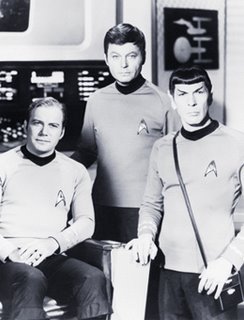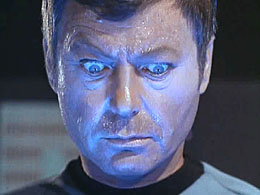Would not a society based on strict logic provide a less passions-based mechanism for the female to release herself from the primitive mating bond?
Oh yeah definitely! But then it wouldn't be such good TV would it? I think T'Prings "flawless logic" was based on a number of simple criteria for the bout in her mind, something like the following (translated into English):
- The bout has to happen
- I must end up with Stonn
- Stonn must not take part in it, he might get get killed
- Whoever wins must not want me, but as I am such a babe all Vulcans want me so Spock must fight a non-Vulcan
- If Spock wins he must not want me, so I'll get him to fight someone that he loves more than me, if he kills that person then he'll hate me
But as you say, she (like humans) ignored the "X factor" - the things that could go wrong.
Trusting that something bad will happen is an interesting concept. It shows no fear. Could the words "trust", "hope" and "fear" be replaced with "I expect" -- taking all the emotions out of the words? From your treatise the words "trust" and "hope" imply a "running towards" an event, where the word "fear" implies a "running away" from an event (a flight). Attributes of "running towards" and "running away" could be characteristics of any organism that resulted from a survival-of-the-fittest selection process, but they would need to be in balance. If a creature always ran towards its food source it would not survive as well as the creature that also ran towards its food source but had a good look around for traps whilst it was doing so, and ran away if necessary. Survive and breed more.
I enjoyed your assessment of the Spock/Bones splits, although Chekov ended up with more than 100 !
Sheesh, of course dilithium crystals control the matter/anti-matter mix used to power a Cochran warp engine, what did they teach kids in school back then ! "Dateless Geek" lol, Jesus would have approved.
The planet killer was made out of inpenetrable neutronium dear boy ! I guess the science folks were suggesting that as neutrons have no charge then "neutronium" must have been held together by a force stronger than the attraction of unlike charges (which is an electro-magnetic effect). If the neutrons in neutronium were bound by either the weak or strong nuclear forces (which were known in the 1960's as "the nuclear force") then it would have been a lot tougher than ordinary matter.
Poq quiz 2: which two Star Trek things were named "Masada"? (One is connected to the Doomsday episode)
According to the Star Trek Encyclopedia, Masada "was probably named for the hilltop fortress where Jews defied Roman legions, eventually committing suicide en masse rather than surrender." (p.291) Based on this reference, some fans have speculated that Masada was an Israeli Jew.




